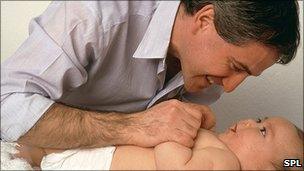UK offers families raw deal, says Fatherhood Institute
- Published

Statutory paternity leave in the UK lags behind some other countries
Conditions for equal parenting in the UK are the fourth worst out of 21 countries measured, according to a new table published by a think tank.
The UK has a wider gender pay gap and less paid paternity leave than other nations, the Fatherhood Institute says.
Its "family fairness" table factors in proportions of women in management and men working part-time, and the ratio of fathers' to mothers' time spent caring.
A family-friendly UK remains a long way off, the institute argues.
Its chief executive Rob Williams said: "The fairness in families index gives a benchmark for where Britain stands in terms of how far policies allow families to share parenting and be more 'equal'.
"Parents' choices are restricted by an outdated distinction between fathers as breadwinners and mothers as homemakers. There is clearly a long way to go if we are to become 'the most family-friendly country in Europe' as the coalition has pledged."
The institute, which lobbies for greater involvement by fathers in children's lives, said it used Organisation for Economic Co-operation and Development data on 10 indicators and had the results validated by an international panel.
'Equal caring'
Despite the UK faring well in areas such as the amount spent per head on childcare, only Japan, Austria and Switzerland fared worse overall.
Men in Sweden, which headed the table, were eligible for the equivalent of 40 weeks' full-time paid paternity leave, based on the average salary.
However, while their British counterparts were entitled to two weeks' statutory leave, the sum paid was the equivalent of just two days at the average pay, the research found.
Mr Williams said "We need to establish a better framework in the UK to support equal earning and caring. Much more needs to be done to make families fairer - and getting the paternity leave system right is a good place to start."
A study published in April suggested the number of fathers who cared for children full-time had jumped 10% over the previous decade, to 600,000 or around 6% of all fathers.
- Published26 August 2010